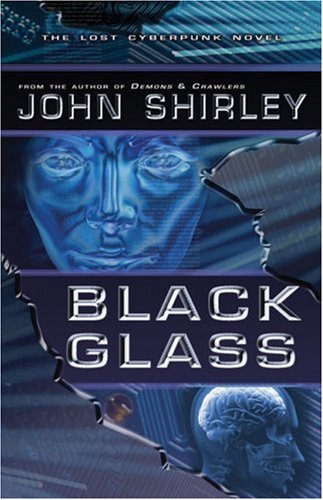 By JOHN SHIRLEY (Elder Signs Press; 2008)
By JOHN SHIRLEY (Elder Signs Press; 2008)
For those of us who thought cyberpunk was dead, here’s proof to the contrary: a brand new cyberfest by John Shirley, who’s widely credited as the genre’s “father.” BLACK GLASS is based on a concept cooked up by Shirley and NEUROMANCER’S William Gibson back in the early days of cyberpunk. Why Shirley thought it a good idea (which Gibson evidently didn’t) to revisit the cyber milieu now I’m not sure—but then if John Shirley did things the cut-and-dried way he wouldn’t be John Shirley.
For those of us who thought cyberpunk was dead, here’s proof to the contrary,,,
The novel is a strong one, in any event. In keeping with my tastes, it forsakes the high tech romanticism of NEUROMANCER in favor of a dark and scary evocation of a future world threatened by a renegade “Multisemblant”—a virtual being comprised of the darkest impulses of five powerful individuals. Shirley dedicates the book to Gibson, Bruce Sterling and several other genre luminaries, but it reminded me more of the bleak cyber-nightmares of Jack Womack, of AMBIENT and RANDOM ACTS OF SENSELESS VIOLENCE infamy (Gibson: “If you dropped the characters from NEUROMANCER into Jack Womack’s Manhattan, they’d fall down screaming and have nervous breakdowns”).
Ultimately, though, BLACK GLASS is very much a product of Mr. John Shirley. In many ways it picks up where his early science fiction effort CITY COME A’ WALKIN left off, with that 1980 novel’s all-powerful human cityscape replaced with the equally formidable Multisemblant, who’s very much a 21st Century creation.
There’s much startling violence here, and some smart social commentary.
It’s the brainchild of Grist, the scumbag head of a multinational corporation called Slakon. Located in L.A. of 2033 AD, this outfit specializes in creating virtual copies of people called semblants (the Multisemblant is the natural outgrowth of this trend, with several personalities packed into one being). Grist’s immediate concern, however, is the novel’s hero Candle, who’s just been released from prison, having taken the fall for his loser brother Danny. Candle has incriminating information about Grist, who pursues Candle as he searches the L.A. underworld for Danny.
The latter is a V-Rat, or virtual reality addict, who spends his time hanging around an environ called Rooftown and having virtual sex. He also has a stolen program that can identify semblants, which makes him and his bro even more dangerous to Grist, as rendering semblants and flesh and blood humans indistinguishable is part of his goal.
Overlaying all this is the Multisemblant, who’s steadily gaining power and influence, banking on nothing less than world domination. Also opposing our heroes is a weather condition known as Black Wind, a mass of toxic mist set to blanket LA and suffocate anyone who breathes it.
There’s much startling violence here, and some smart social commentary. Shirley has actually rendered this decades-old concept timely and significant. The idea of Rooftown, a high-up city built upon extremely precarious foundations, obviously contains any number of pertinent metaphors for our time. So does the multisemblant, who represents perhaps the ultimate example of horizontal integration. But as Shirley states in his forward, “my main hope for BLACK GLASS is simply that readers will enjoy it as entertainment,” and in that area he’s succeeded.
